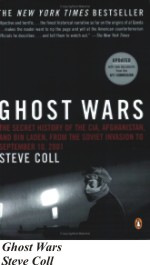|
Book Review
Ghost Wars
Amna Zubair
Ghost Wars is a 600-page, New York Times Bestseller written by Steve Coll, a Pulitzer Prize-winning journalist and former Washington Post South Asia bureau chief. He is currently an associate editor with the Washington Post.
The book was first published in 2004 and then an updated version hit the press in 2005, which included documents from the 9/11 Commission report. It's a must-read for diplomats, foreign policy analysts and individuals in the field of international relations/affairs.
 This book is essentially a primer for those who want to know about the inner operatings of the CIA, GID (Saudi Intelligence), ISI (Pakistani Intelligence), the origins of the Afghan war with the Soviets, the rise of the Taliban, international diplomacy, and the role of the major players involved, US, Saudi Arabia and Pakistan, upto 10 September 2001. This book is essentially a primer for those who want to know about the inner operatings of the CIA, GID (Saudi Intelligence), ISI (Pakistani Intelligence), the origins of the Afghan war with the Soviets, the rise of the Taliban, international diplomacy, and the role of the major players involved, US, Saudi Arabia and Pakistan, upto 10 September 2001.
The author goes into detail to discuss the background of each character in the book such as Hamid Karzai (President of Afghanistan and his predecessors), Gulbuddin Hekmatyar, Ahmed Shah Massoud, William Casey (former Director of the CIA and every successive director after him, including George Tenet), General Aktar Abdur Rahman (former Chief of ISI, and every successive Chief after him), Prince Turki Al-Faisal (former Director of GID), Bill Clinton (former U.S. President), General Musharraf (President of Pakistan and his predecessors), Bin Laden and many others.
What's interesting about this book is that it's about the recent past. Learning about the characters and events then, gives us a better understanding of the characters and events now.
For instance, Bill Clinton, a lawyer by profession, always had high regard for international law, the United Nations and the power of resolving conflicts through words and peaceful negotiations. Bill Clinton is presently a UN Special Envoy. On 20 July 2005, when Prince Bandar announced he would retire as Saudi Ambassador to Washington after 22 years, Riyadh could not have made a better choice when it appointed Georgetown-educated, Prince Turki Al-Faisal, who had previously served as Director of GID and as Ambassador to the Court of St. James, to replace him.
The book also ties in with recent events. On 30 July 2005, Uzbekistan's government announced that it had given the US six months to leave the air base near the southern town of Khanabad, known as K2. The author explains the vital importance of the air base to the US.
The author also discusses conflicting foreign policy dilemmas that the US, Saudi Arabia and Pakistan each face, as each seeks to tend to its own greater national interest while putting on a balancing act to appease the other. The book also discusses rifts in relationships, between a foreign service officer and his Ambassador, between an Ambassador and the host country's Prime Minister and also between a spy chief and his foreign counterpart to mention a few.
Further in the book, the author tells the story of ISI in Pakistan, from its inception as a modest operation to a clandestine force--a shadow government, as the author puts it. While discussing clandestine operations in Pakistan, the author roves over to the other side of the Atlantic and provides detailed insights as to the inner workings of the CIA and the relationship between the CIA, the State Department and the White House, so that the reader gets to read both sides of a coin at the same time without missing a heart beat.
The author does a good job of portraying the humane side of things -- human emotions, how people react, what ticks them off, how being undiplomatic or condescending may have the converse affect on relationships and how being too diplomatic may also lead to dire consequences. The author lets the reader be the judge. The book is filled with diplomatic nuances and social mores which at times allows a reader to draw parallels with his or her everyday workplace.
The book is full of factual intrigue and more. Very artfully crafted, the author sets the reader in motion just as a carpenter begins chiseling a fresh block of wood. Chiseling away bit by bit as each chapter passes gradually giving it shape. By the time you turn to the last page, the author has neatly carved out the block he started with. Voila ! he's just carved out the muzzle of a gun--by the time you reach the end of the book he's made a damn good case for the US's incursion into Afghanistan !
At the end of the book, there are detailed notes on each chapter with references to sources and an exhaustive bibliography.
Copyright
(R) thedailystar.net 2005 |
